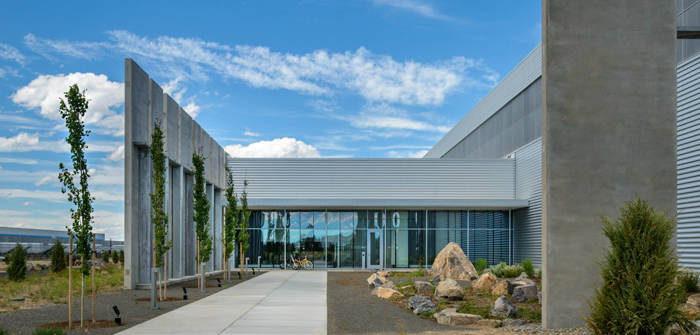Study Finds Domestic Facebook Data Centers Have Contributed Nearly $6 Billion in GDP, Support Thousands of Jobs, and Spur Growth of Clean and Renewable Energy
Prineville Data Center has seen an investment of more than $1 billion and has more than
200 full time workers
A new study, conducted by RTI International and released today, found that Facebook’s four operational domestic data centers—located in Prineville, Oregon; Fort Worth, Texas; Altoona, Iowa; and Forest City, N.C.—have contributed $5.8 billion in GDP to the U.S. economy since 2010.
The study, entitled “The Impact of Facebook’s U.S. Data Center Fleet,” also found that the data centers benefit local communities by driving investment in renewable energy and providing impactful grants that support local schools and nonprofits.
From 2010 to 2016, these four data centers spent approximately $4.2 billion, with the largest contributions going to the construction, wholesale trade and real estate sectors. The study also found that, due to Facebook’s commitment to hiring and sourcing materials locally, for every data center job, there are five jobs supported elsewhere in the economy. Additionally, for every $1 million in Facebook’s operations spending, there are 13 jobs supported in the economy.
In Prineville, Facebook has already made a capital investment of over $1 billion in the campus. In December 2017, the company announced construction of two new buildings for an additional investment of hundreds of millions of dollars. This translates into keeping construction crews busy for another four years, plus additional full-time jobs as the data centers come online.
As of September 2017, Facebook’s data center operations in Prineville employed more than 200 people working full time, with approximately 75 percent of these workers living in Prineville/Crook County.
“Facebook’s economic impact in Prineville has been tremendous. The community, led by the city and county, recognized the strategic need to diversify its rural economy via the data center industry,” said Roger Lee, CEO of Economic Development for Central Oregon (EDCO). “When Facebook broke ground in 2010, unemployment in Crook County was at 17 percent—the highest in the state. Today, it sits at 6.5 percent and continues to edge lower. Facebook and Prineville have found fantastic partners in each other.”
In addition to the data centers’ economic impact, the report also addresses Facebook’s impact around energy conservation and renewable energy. Facebook data centers are among the most advanced energy- and water-efficient facilities in the world, utilizing 38 percent less electricity and 50 percent less water than an average data center. Between 2011 and 2016, Facebook avoided using over 2.5 million megawatts of carbon-intensive electricity, which resulted in CO2 emissions reductions of over 1.15 million metric tons.
This commitment has resulted in not only a significant reduction in CO2 emissions and the use of grid-generated electricity and water, but it also has spurred others to invest in renewable-energy resources in the states hosting the data centers. To date, Facebook has brought more than 500 MW of new wind and solar energy to the grid, with more coming online this year.
Facebook’s Prineville Data Center campus was its first wholly owned real estate, and its energy- and water-efficient design provided the template for the company’s subsequent data centers. It also led Facebook to create the Open Compute Project and to open-source its designs for other companies to use.
Community impact is also detailed in the report, and reflects Facebook’s commitment to playing a positive role in the places where it operates. Since 2011, Facebook has awarded more than 290 grants supporting projects that put the power of technology to use for community benefit, help improve education at all levels, and encourage the community to participate in local activities.
In Prineville, Facebook has donated almost $1,470,000 to qualified nonprofits and Crook County schools through community action grants and local donations, including the support of STEM (Science, Technology, Engineering and Mathematics) education. Almost 25 percent of the grants have gone to Crook County elementary, middle and high schools, for a total $345,000.
Earlier this month, the data center announced the newest Facebook Prineville Local Community Action Grants, giving $204,870 to 20 outstanding Crook County nonprofits and schools supporting short-term, high-impact projects that address critical community needs. The grants included $45,000 to Central Oregon Trail Alliance (COTA) to help fund the construction and upgrading of Prineville’s Lower 66 trail system, creating an easy three-mile trail accessible to strollers, walkers, cyclists and others; $23,000 to the Crook County High School Computer Science/Technology Department for a experiential learning project around disassembling old computers and replacing the outdated components with modern hardware; and $19,900 to Humane Society of the Ochocos to fund design plans for a more modern and efficient facility.
“Crook County High School has received a number of community grants from the Facebook Prineville Data Center over the last six years, enabling many enriching and engaging learning experiences for the students of Crook County High School,” said Michelle Jonas, Principal, Crook County High School. “We are proud to partner with Facebook to improve the lives of our students, and are very grateful for their support.”
About Economic Development for Central Oregon (EDCO)
Economic Development for Central Oregon (EDCO) is a non-profit corporation supported by private and public members and stakeholders, whose mission is to create middle-class jobs in Central Oregon by: recruiting new employers to move to the region; helping entrepreneurs start new, scalable businesses; and working with businesses that are already here to grow their operations. For more information, visit www.edcoinfo.com.





